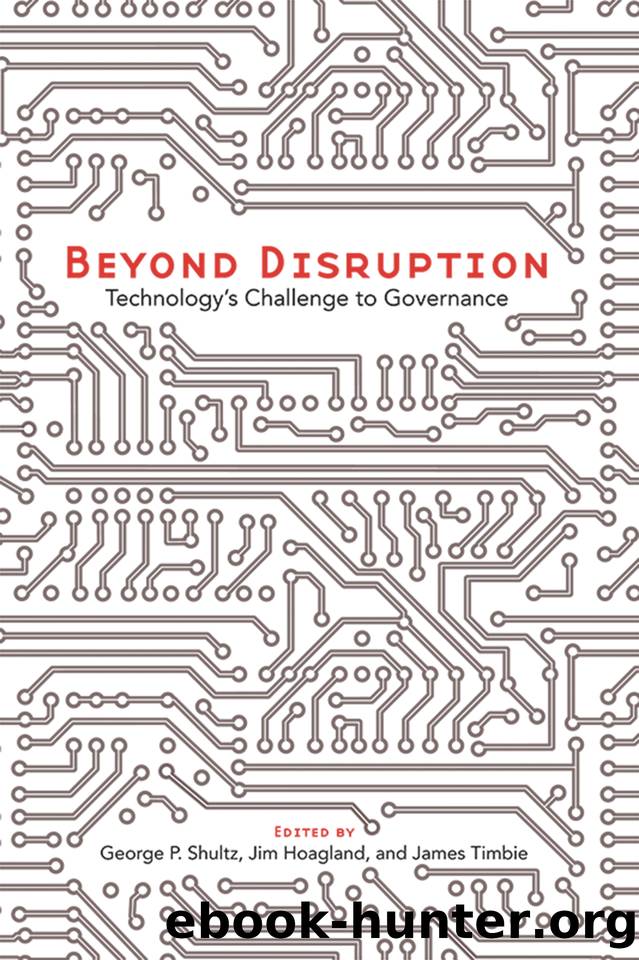Beyond Disruption: Technology's Challenge to Governance by George P. Shultz & Jim Hoagland & James Timbie

Author:George P. Shultz & Jim Hoagland & James Timbie [Shultz, George P. & Hoagland, Jim & Timbie, James]
Language: eng
Format: epub
Tags: Philosophy, Ethics & Moral Philosophy, Political Science, Public Policy, General, Technology & Engineering, Social Aspects
ISBN: 9780817921453
Google: sJchuAEACAAJ
Amazon: B07F42S92D
Barnesnoble: B07F42S92D
Goodreads: 40726180
Publisher: Hoover Institution Press
Published: 2018-01-15T06:42:25+00:00
Generations succeeding generations, technology and the humanities grow farther apart. Technology took the lead, and technology has now become the master of the scene.
âCharles Hill
***
In many ways, networks were the key to what happened in American politics in 2016. There was the grassroots network of support that Donald Trumpâs campaign builtâand that built itselfâon the platforms of Facebook, Twitter, and Breitbart. These were, to use Trumpâs words, the âforgottenâ men and women who turned out on November 8 to defeat the âglobal special interestsâ and âfailed and corrupt political establishmentâ that Trumpâs opponent Hillary Clinton was alleged to personify. A role was also played by the jihadist network, as the Islamic Stateâ affiliated terror attacks during the election year lent credibility to Trumpâs pledges to âstrip out the support networks for radical Islam in this countryâ and to ban Muslim immigration.
As a very wealthy man who could nevertheless play the role of demagogue with aplomb, Trump himself embodied a central paradox of the age. He was at once a minor oligarch and a major brand. Trump is perhaps unique in having assumed the office of president with a tangled network of businesses, investments, and corporate linksâto as many as 1,500 people and organizations.26 At the same time, Trumpâs campaign succeeded where his opponents failed in harnessing the networks of Silicon Valley, to the dismay of the people who owned and thought they also controlled the networks. Their agony in the weeks after the election was palpable. Google at first sought to woo the new administration, only to denounce its executive orders limiting travel and migration to the United States from certain Muslim-majority countries.27 Mark Zuckerberg absented himself from a meeting with the new president attended by other technology CEOs. Presumably it was some comfort to him that the Womenâs March against Trump had also organized itself through Facebook.28 It is hard to believe that there will not be some kind of clash between the Trump administration and the big information and communications technology companies, especially if the administration overturns its predecessorâs decision in 2015 that the Federal Communications Commission should regulate the internet as a public utility, like the old railroad or telephone networks. There seems an obvious conflict of interest between telecom and cable companies and bandwidth-greedy platform content providers such as Netflix over the issue of ânet neutralityâ (the principle that all bits of data should be treated alike, regardless of their content or value).29 Antitrust action against the FANG companies could be Trumpâs next move, though it would be surprising if a Republican administration went down that route. What seems highly unlikely is that Silicon Valley companies will continue to enjoy the exemptions from being treated as publishers that they were granted under the Telecommunications Act (1996).
Yet in two respects there is a clear similarity between our time and the revolutionary period that followed the advent of printing. Like the printing press, modern information technology is transforming not only the marketâmost recently, by facilitating the sharing (i.e., short-term rentals) of cars and apartmentsâbut also the public sphere.
Download
This site does not store any files on its server. We only index and link to content provided by other sites. Please contact the content providers to delete copyright contents if any and email us, we'll remove relevant links or contents immediately.
The Secret History by Donna Tartt(19048)
The Social Justice Warrior Handbook by Lisa De Pasquale(12187)
Thirteen Reasons Why by Jay Asher(8893)
This Is How You Lose Her by Junot Diaz(6877)
Weapons of Math Destruction by Cathy O'Neil(6264)
Zero to One by Peter Thiel(5786)
Beartown by Fredrik Backman(5737)
The Myth of the Strong Leader by Archie Brown(5498)
The Fire Next Time by James Baldwin(5431)
How Democracies Die by Steven Levitsky & Daniel Ziblatt(5213)
Promise Me, Dad by Joe Biden(5141)
Stone's Rules by Roger Stone(5081)
A Higher Loyalty: Truth, Lies, and Leadership by James Comey(4951)
100 Deadly Skills by Clint Emerson(4920)
Rise and Kill First by Ronen Bergman(4779)
Secrecy World by Jake Bernstein(4740)
The David Icke Guide to the Global Conspiracy (and how to end it) by David Icke(4701)
The Farm by Tom Rob Smith(4502)
The Doomsday Machine by Daniel Ellsberg(4484)
